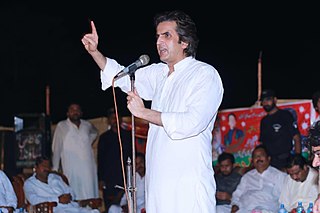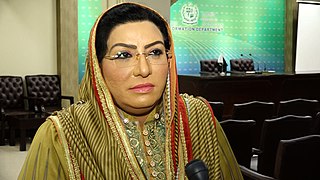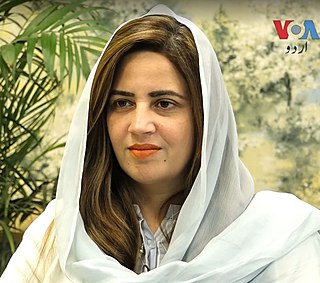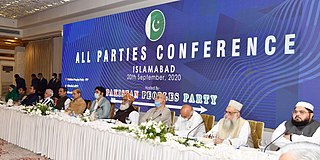
Imran Ahmed Khan Niazi is a Pakistani politician and former cricketer who served as the 22nd prime minister of Pakistan from August 2018 until April 2022. He is the founder and chairman of the political party Pakistan Tehreek-e-Insaf (PTI).

Makhdum Khusro Bakhtyar is a Pakistani politician who recently served as Pakistan's Federal Minister for Industries & Production. Previously, he has served as Federal Minister of Economic Affairs, Federal Minister of National Food Security and Research and Federal Minister for Planning, Development and Reforms in the PTI Government under the leadership of Prime Minister Imran Khan. He had been a member of the National Assembly of Pakistan from 2002 to 2008, 2013 to 2018 and 2018 till 2023.

Firdous Ashiq Awan is a Pakistani politician from Pakistan Tehreek-e-Insaf. She has served as Special Assistant to Prime Minister on Information and Broadcasting from 2019 to 2020, Federal Minister for National Regulations and Services from 2012 to 2013, Federal Minister for Information and Broadcasting from 2011 to 2012 and as Federal Minister for Population Welfare from 2008 to 2010. She served as the Special Assistant to the Chief Minister of Punjab on Information and Culture, in office from November 2020 to 6 August 2021.

Murad Saeed is a Pakistani politician who served as Federal Minister for Communications and Federal Minister for Postal Services from December 2018 to April 2022.
Prime Minister's Youth Programme is an initiative by the former prime minister of Pakistan Nawaz Sharif established in 2013. The purpose of the programme is to ensure the provision of quality education, and meaningful employment to the youth through integrated, sustainable youth initiatives. The programme provided government-subsidised business loans of up to 25 million rupees, under three tiers: first-tier for 10000 to 1 million, the second tier for 1 million to 10 million, and the third tier for 10 million to 25 million. The programme also provided a skills scholarship program, a talent hunt for youth sports, and a national youth council.

Ali Jehangir Siddiqui is a Pakistani diplomat and entrepreneur. He has served as the Ambassador of Pakistan to the United States, as Special Assistant to the Prime Minister of Pakistan with the status of Minister of State and Pakistan's Ambassador for Foreign Investment in an honorary capacity. He has also served in various business and government advisory councils, policy institutions, and commercial entities.

Noor-ul-Haq Qadri is a Pakistani politician who was Federal Minister for Religious Affairs and Inter-faith Harmony. He had been a member of the National Assembly of Pakistan from August 2018 till January 2023. Previously, he was a member of the National Assembly from 2002 to 2013.

Zartaj Gul is a Pakistani politician who served as Minister of State for Climate Change, in Imran Khan ministry from 5 October 2018 until 10 April 2022 when Imran Khan was ousted by a no-confidence motion. She remained a member of the National Assembly of Pakistan between August 2018 and January 2023.
Aamir Mehmood Kiani was a Pakistani politician who served as Federal Minister for National Health Services, Regulation and Coordination, from 20 August 2018 to 18 April 2019. He had been a member of the National Assembly of Pakistan from August 2018 till January 2023.

Fawad Ahmed Hussain Chaudhry is a former Pakistani politician and a former senior member of Pakistan Tehreek-e-Insaf, who was Federal Minister for Information and Broadcasting, in office since 14 April 2021 to 10 April 2022. He parted ways with Imran Khan and the PTI on 24 May 2023 after being threatened by the Pakistani Army, announcing he was leaving politics.

The Imran Khan ministry was the government of Pakistan which was formed by Imran Khan following his successful election as Prime Minister of Pakistan by the National Assembly. The Cabinet had 25 Federal Ministers, 4 Ministers of state and 4 Advisors, most of whom assumed office on 20 August 2018.
The first 100 days of Imran Khan's prime ministership began with his swearing-in ceremony on 18 August 2018 as the 22nd Prime Minister of Pakistan – shortly after the oath-taking of the 15th National Assembly of Pakistan on 13 August, and the elected parliament's vote of confidence for Khan's premiership on 17 August. The 100th day of his prime ministership was 25 November 2018.
Sayed Zulfikar Abbas Bukhari, also known as Zulfi Bukhari, is a Pakistani multi-millionaire businessman, politician and film producer.

The Pakistan Democratic Movement, or PDM, is a coalition of political parties in Pakistan. It was founded in September 2020 as a movement against then prime minister Imran Khan, accusing his regime of poor governance, political victimisation of opponents, and mismanaging the economy and foreign policy. The struggle was also joined by several dissident members of Khan's own party, Pakistan Tehreek-e-Insaf (PTI). On 10 April 2022, the coalition succeeded to oust Khan through a no-confidence motion, after which the PDM formed its own government, choosing the opposition leader Shehbaz Sharif as the country's prime minister.
Ehsaas Programme is a social safety and poverty alleviation programme formerly known as Benazir Income Support Program (BISP) launched by Government of Pakistan in 2008. Prime Minister of Pakistan called it a key initiative towards a welfare state that PPP promised with people of Pakistan in their elections manifesto. It is aimed at uplifting the backward class, reducing inequality, investment on masses and lifting the lagging districts in the country. A separate ministry was established under Poverty Alleviation and Social Safety Division which is headed by Special Assistant to Prime Minister was serving as chairperson of Benazir Income Support Programme. As of 2021, Ehsaas Programme has two major pillars, one is Ehsaas Emergency Cash and the other is Ehsaas Kafalat, the latter programme expanded its coverage from 7 million people to 10 million people in 2021. NSER New Registration
Sardar Abdul Qayyum Khan Niazi is a Kashmiri politician from Azad Jammu and Kashmir who was the 13th Prime Minister of Azad Kashmir from August 2021 to April 2022. He has been a member of the Azad Jammu and Kashmir Legislative assembly since August 2021. He has been the president of Pakistan Tehreek-e-Insaf's Azad Jammu and Kashmir chapter since April 2023.
National Rahmatul-lil-Alameen Wa Khatam an-Nabiyyin Authority is an ideological institution of the Government of Pakistan. Set up under the Federal Ministry of Education & Professional Training by the former Prime Minister Imran Khan in October 2021, the first Chairman was Ijaz Akram. The ordinance to set up the authority was promulgated by President Arif Alvi on 13 October 2021. In July 2022, JUI-F former MNA Shahida Akhtar Ali suggest the new name of the authority by adding Khatam an-Nabiyyin, which was endorsed by President of Pakistan, Arif Alvi per suggestion as National Rahmatul-lil-Alameen Wa Khatam an-Nabiyyin Authority formerly National Rahmatul-lil-Alameen Authority.

In April 2022, a no-confidence motion against Imran Khan led to his removal as the prime minister of Pakistan. Based largely on the Westminster system of legislature, the prime minister commands confidence of the majority of the lower house of Parliament, the National Assembly of Pakistan, under clause (2A) of Article 91 of the Constitution. Numerous opposition parties joined forces to file the motion of no confidence against Imran Khan in the National Assembly. It ultimately led to the removal of Khan from office as a majority passed the motion in the Lower House.
A political and constitutional crisis emerged in Pakistan from, 3 April 2022 to 10 April 2022 when, National Assembly's Deputy Speaker Qasim Khan Suri dismissed a no-confidence motion against Prime Minister Imran Khan during a session in which it was expected to be taken up for a vote, alleging that a foreign country's involvement in the regime change was contradictory to Article 5 of the Constitution of Pakistan. Moments later, Khan stated in a televised address that he had advised President Arif Alvi to dissolve the National Assembly. Alvi complied with Khan's advice under Article 58 of the constitution. This resulted in the Supreme Court of Pakistan (SCP) taking a suo motu notice of the ongoing situation, creating a constitutional crisis, as effectively, Imran Khan led a constitutional coup. Four days later, the SCP ruled that the dismissal of the no-confidence motion, the prorogation of the National Assembly, the advice from Imran Khan to President Arif Alvi to dissolve the National Assembly, and the subsequent dissolution of the National Assembly were unconstitutional, and overturned these actions in a 5-0 vote. The Supreme Court further held that the National Assembly had not been prorogued and had to be reconvened by the speaker immediately and no later than 10:30 a.m. on 9 April 2022.
Connecting citizens of Pakistan with their Government. Prime Minister's Performance Delivery Unit (PMDU) established in 2013 has been reorganized with a new RULES IN 2018










